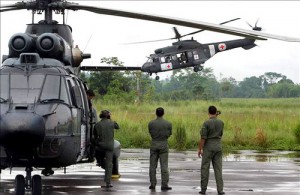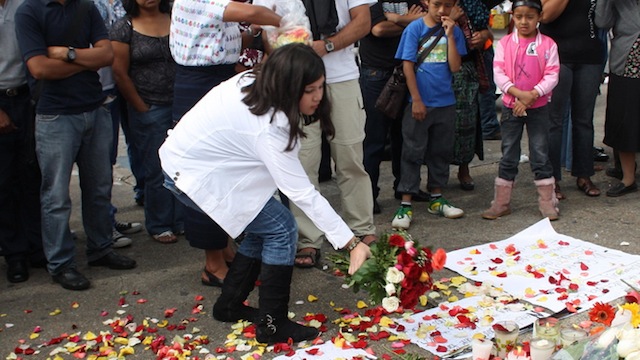
Colombia, Latin America: Week in Review
Colombian Supreme Court Refuses FARC Files As Evidence
May 20, 2011 By Staff
Today in Latin America
Top Story — Colombia’s Supreme Court on Wednesday refused to admit as evidence files taken from a FARC guerrilla commander’s computer in a 2008 raid — a move that could potentially undermine prosecutors in up to 15 cases against politicians accused of collaborating with the FARC.
The ruling applies only to the case of William Borja, a former congressman for the Polo Democrático party.
The files taken from the computer of a FARC Commander known by his alias as Raúl Reyes have generated controversy since the Colombian military first obtained them during the operation that killed Reyes in neighboring Ecuador in 2008. Some view the FARC files as a smoking gun implicating a host of politicians including Venezuelan President Hugo Chávez and Ecuadoran President Rafael Correa, while others dispute the files’ authenticity.
The Court’s ruling does not challenge the documents’ validity, but said they were not admissible. The military seized the computers illegally because Colombia’s international agreements specify that Ecuadoran police agents should have handled evidence to be presented in Colombia, the Court said. The Correa administration did not approve the 2008 raid in Ecuadoran territory.
The Court also said the files could not be admitted because the documents in question were emails, but they were saved as text files and there was no evidence that the communications were ever sent or received.
Though the Supreme Court President Camilo Humberto Tarquino said the decision did not have implications for “current or future investigations,” ex-Senator Piedad Córdoba, also of the Polo Democrático, said she would appeal the decision that cost her seat in Congress based on the Borja ruling. Córdoba lost her seat in 2010 over allegations of collaborating with the FARC based on seized files. She is prohibited from holding political office for 18 years.
Prosecutor Hermes Ardila said the decision means cases based on the files “are almost collapsing because if we only have as evidence the information found in the computers, with the court’s decision, this evidence is no longer valid.” Prosecutors will now review the 15 pending cases to see which ones have sufficient evidence to move forward.
The controversy surrounding the FARC files returned in recent days, after London-based think tank International Institute for Strategic Studies published a book-length study based on the seized documents. Following the publication of the book, the Ecuadoran attorney general’s office said it would investigate President Rafael Correa over allegations that the FARC contributed $400,00 to his 2006 presidential campaign.
Just Published at the Latin America News Dispatch
- Demobilized FARC guerrillas face poverty, lack of jobs and numerous temptations upon returning to civilian life, reports Russ Finkelstein from Bogotá.
Headlines from the Western Hemisphere
North America
- A Mexican federal court sentenced Bolivian pastor to seven years in prison for the 2009 hijacking of a plane as it landed in Mexico City.
- Mexican organized crime groups have begun to use ultralight aircraft to ferry drugs from Mexico into the United States.
- Michigan Gov. Rick Snyder said Thursday that the state does not need an immigration law like the one causing controversy in Arizona as it would “encourage a divisive atmosphere.”
Caribbean
- The U.S. State Department revoked visas for a number of Haitian citizens, an American diplomat in the Caribbean country announced Thursday.
Central America
- Nicaraguan authorities evacuated hundreds of people from the Telica volcano in the western part of the country, due to heightened seismic activity.
- Canada’s Department of Foreign Affairs issued a travel warning to Petén, Guatemla because of the recent increase in violence due to drug trafficking.
- A former CEO of a U.S.-based telecommunications company pleaded guilty to conspiring to bribe Honduran officials in order to win a major contract.
Andes
- Ecuador’s President Rafael Correa won a vote on 10 reforms, including controversial measures to regulate Ecuador’s judiciary and news media, according to a final count Thursday of the May 7 vote.
- A Venezuelan citizen living in Florida pleaded guilty to one count of conspiracy to obstruct an official proceeding of the U.S. Securities and Exchange Commission (SEC).
Southern Cone
- Brazilian police warned that Paraguay is now a base of operations for Brazil’s criminal organizations, who hope to cut middlemen out of the drug trade.
- Uruguay’s parliament is voting to annul the country’s 1986 amnesty law, which gives armed forces members protection from prosecution for human rights abuses before 1985.
- Google has not changed its search engine in Argentina despite a court order because it has not yet received an official order from the court.
- Chile’s central bank president said the country’s economy is not overheating, despite first-quarter growth at a 15-year high.
Image:Globovisión @ Flickr.
Subscribe to Today in Latin America by Email







1 Comment
[…] Colombian Supreme Court Refuses FARC Files As Evidence | Latin America News Dispatch. […]
Comments are closed.